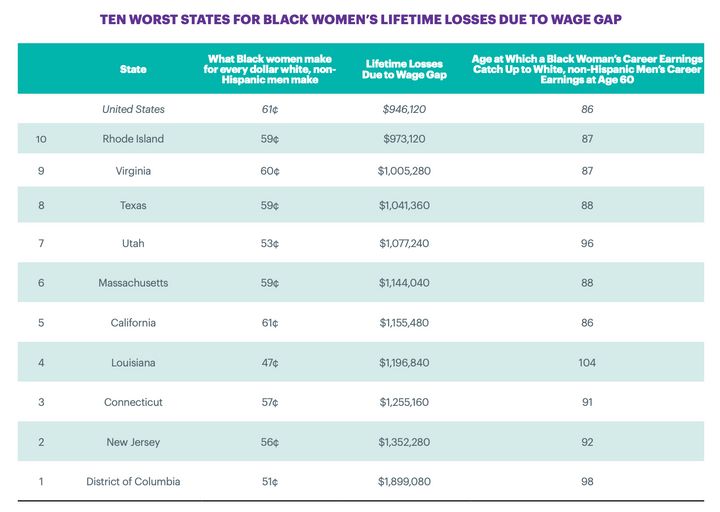[ad_1]
Aug. 22 is Black Women’s Equal Pay Day. It marks the point when Black women’s income finally caught up to earnings of white non-Hispanic men in the previous calendar year.
Despite efforts to raise awareness of the pay gap, this year’s Black Women’s Equal Pay Day comes more than two weeks later than last year’s.
On average, Black women in America make 61 cents to every dollar a white man makes. Regardless of socioeconomic or education level, Black women work decades longer than white men to match their earnings, according to a study released this month by the National Women’s Law Center.
The analysis shows Black women are losing out on $23,653 yearly. Over the course of a 40-year career, that totals $946,120.
In order to match the lifetime earnings of a 60-year-old white man, a Black woman would have to work until she’s 86 years old, if they both started working at age 20. The gap is even greater for Black women born outside of the U.S., who make just half the earnings of foreign-born men in this country.
A nearly $1 million loss over a decades-long career is “unfathomable,” Jasmine Tucker, director of research at the National Women’s Law Center, told HuffPost.
It’s like “losing out on the American dream,” Tucker said. “A million dollars is child care, it’s health care, it’s a house, it’s economic stability. And that’s just straight earnings.”
It doesn’t stop there. The disparity widens depending on where you live. In Louisiana, Connecticut, California, New Jersey, Massachusetts, Texas, Utah and Virginia, lifetime wage losses equate to more than $1 million. Washington, D.C., has the worst U.S. income inequality for Black women, where they earn 51 cents to every dollar for white men and accrue a lifetime loss of $1.9 million, according to the study. Black women in D.C. would have to work until they are 98 to make up for those lost wages.

“This is the same old, tired story that’s been going on for decades,” Tucker said. “I think that the sort of interesting thing is that Black women are gaining political power right now. Black women are gonna continue to drive the movement forward and they’re gonna continue because they’re the one pushing this forward and there’s a mismatch between their growing political power and [them] falling behind terms of economic security and family security.”
Tina Sherman, the paid leave campaign director at MomsRising, and Alicia Garza, Black Lives Matter co-founder and creator of Black Futures Lab, know this old story well.
Sherman, a mother of four, is currently staring at what a lifetime’s work of pay disparity looks like numerically as she helps her mother prepare for retirement. Garza recalled watching her single mother work multiple jobs to sustain her family while she followed her dreams at night.
But both are now fighting for pay equity for all Black women.
“It is shameful that in this day and age that Black women have to work 20 months to be paid what white men are paid in 12 months,” Sherman said. “It’s racist, it’s sexist and it harms me as a mom, my family and the economy at large. There’s absolutely no justification.”
With MomsRising, Sherman is pushing Congress to pass pay equity legislation, including the Paycheck Fairness Act, which would help protect more workers against pay discrimination.
Garza told HuffPost that as long there is racism within the U.S. economy, the wage and wealth gap will persist.
The Black Futures Lab has joined forces with Phenomenal Woman to launch Phenomenally Black, a campaign that celebrates Black women. On Thursday, celebrities and politicians will wear shirts that read “Phenomenally Black” to highlight Black Women’s Equal Pay Day.
“Oftentimes, we hear things about the wage gap between white women and white men and that’s not necessarily the wage gap between women of color and white men and in particular Black women and white men,” Garza said. “I think for me, what’s so exciting about Phenomenally Black is the opportunity just to make that visible. Not just the struggles that we have — but we also want to be able to highlight the ways in which we are persisting and resisting and enduring circumstances that are not ideal and we want to be able to fo that to encourage and motivate and activate people to take action.”
Garza emphasized the need to include all Black women in this fight, not just cisgender women. She revealed that the results from Black Futures Lab’s forthcoming Black Census Project show that Black trans women are severely impacted by the wage gap.
“What we found is that 85% of Black trans women who responded to our survey reported that they were making incomes less than $50,000 a year and 23% reported that they are making incomes less than $15,000 a year, and so you’ll note that there is incredible opportunity,” Garza said. “I mean imagine what would happen when Black cis women and black trans women got together to fight for better wages for all of us.”
REAL LIFE. REAL NEWS. REAL VOICES.
Help us tell more of the stories that matter from voices that too often remain unheard.
[ad_2]
Source link

